How to Win at Founder-Led Sales: Selling with Soul
Small Business OS: Learn how founders can sell with heart, build trust, and drive early traction without a sales background.
Before there’s traction, a team, or a polished pitch deck, there’s you. Just you, your product, and the nerve to walk into a room and say, “Here’s why this matters.”
That’s founder-led sales.
Not a placeholder until you hire a rep. A rite of passage. A growth engine. A test of belief.
The best founders don’t dodge sales, they embrace them. Not because they’re natural closers, but because they know selling is how you learn, build, and earn trust in the earliest days.
In this guide, we’ll break down the real art of selling with soul - what makes founder-led sales work, how to avoid common traps, and how to turn this superpower into a strategic edge.
Table of Contents
The Founder is the First and Best Salesperson
Why Founder-Led Sales Work
Common Pitfalls and Mistakes Founders Make
Shifting Your Mindset: From Product Builder to Problem Solver
How to Win at Founder-Led Sales
When It’s Time to Scale and Step Back
Selling as Superpower
1. The Founder is the First and Best Salesperson
When Stripe was still just an idea, Patrick and John Collison personally emailed developers, scheduled demos, wrote code, and even helped customers install the product line by line.
Airbnb’s Brian Chesky famously went door-to-door in New York, photographing apartments and pitching skeptical hosts himself. These weren’t distractions, they were the path forward.
Founder-led sales is more than just a tactic. It’s the default setting. In the early days, there’s no marketing team, no brand equity, no social proof. What you do have is belief, urgency, and proximity to the problem. That’s exactly what early customers are buying - your conviction.
As the founder, you’re the most credible person to sell what you’ve built. You know the story behind it, the pain it solves, and why it’s worth caring about. That kind of depth and authenticity can’t be faked or outsourced. And when you’re in the room, you’re doing more than just selling a product, you’re creating trust in the company itself.
Equally important, selling early helps you learn. Every pitch, rejection, or deal closed reveals how your message lands, what problems actually matter to your customer, and what the market really wants. Those insights fuel product improvements, sharper positioning, and, eventually, a repeatable sales playbook.
You don’t need to be a “salesperson” in the traditional sense. You just need to show up, listen closely, and lead with clarity. If you can’t sell it, no one can. And once you can, the rest of the company can follow your lead.
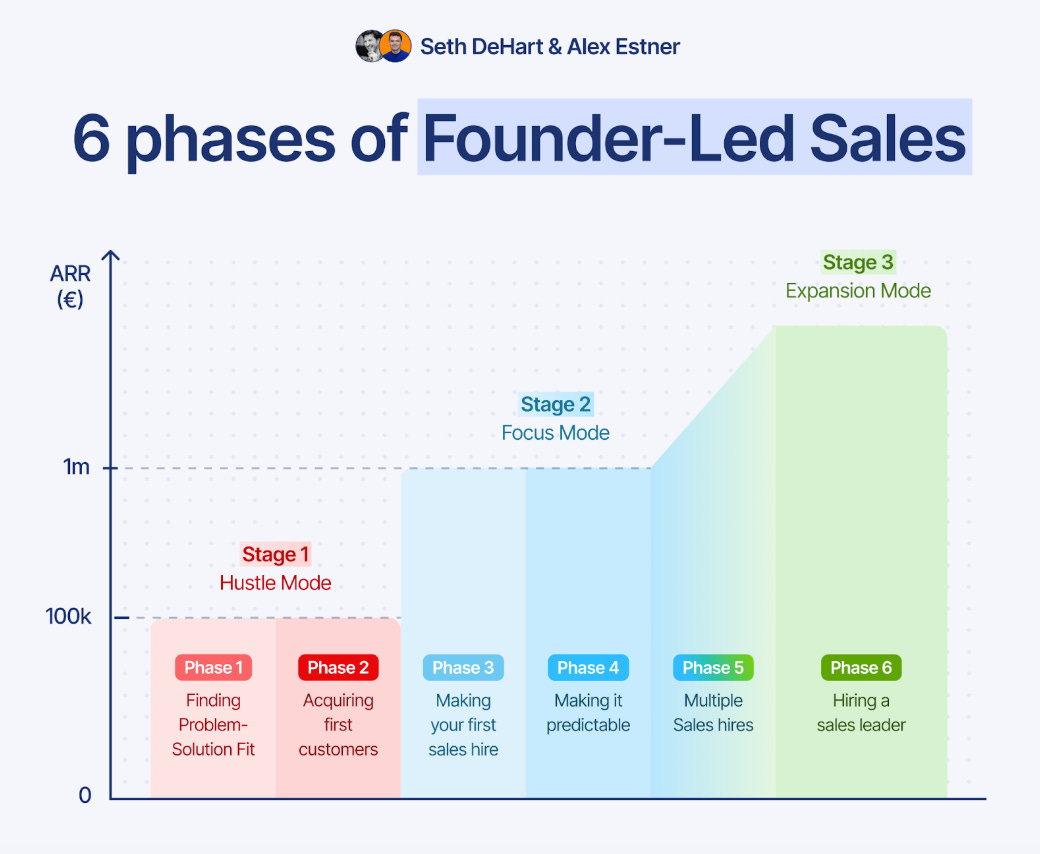
2. Why Founder-Led Sales Work
Founder-led sales works not because you're a sales expert, but because you’re the story. In the early days, that matters more than anything.
Authenticity and credibility
Nobody can sell your product with more conviction than you. Unlike reciting a pitch that regular salespeople do, you’re sharing something you believe in deeply. And customers can feel that. You know the problem because you lived it. You built the product because you had to.
That kind of firsthand story cuts through doubt and makes your words land with weight. Even when you don’t have features fully built or logos on your site, your belief becomes the reason people say yes.
Speed and feedback loops
Selling directly means you're constantly gathering real-time input. You don’t have to wait for a secondhand summary from a sales team. You hear objections as they happen, notice patterns in customer reactions, and can tweak your message or product instantly.
Founders who embrace this cycle sell, learn, and iterate and build stronger products faster. Feedback doesn’t pile up, it feeds forward.
Relationship building
Customers at this stage aren’t just buying your product. They’re betting on you. They want to know the founder is reachable, listening, and genuinely invested in their success. Founder-led sales makes space for that connection.
You don’t need to pretend to be perfect, just be present and responsive. That level of access can turn an early user into a long-term advocate, even if the product has rough edges.
Investor perception
When investors see a founder closing deals, it’s a signal that the market wants what you’re offering and that you’re capable of making it happen. It tells them you’re scrappy, coachable, and tuned in to your customer. On the flip side, if a founder outsources sales too early, it raises questions like:
“Is there real demand?”
“Do they know how to reach it?”
Investors don’t just want to see revenue, they want to see a founder who can build momentum from zero.
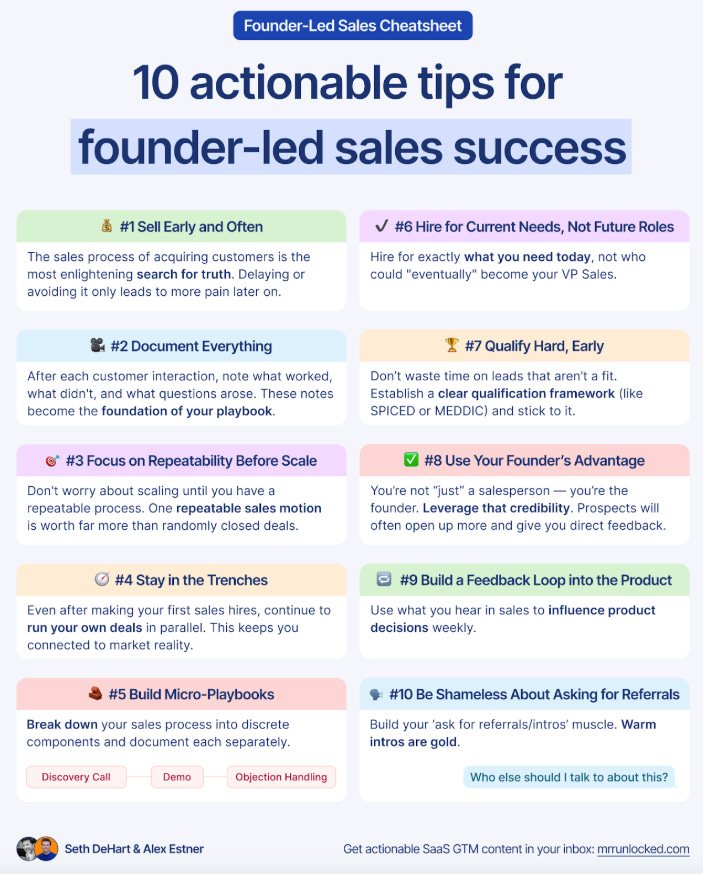
3. Dangerous Traps Founders Fall Into
Founder-led sales is powerful, but only if you avoid the traps that sabotage your momentum.
Selling features instead of solving problems
It’s easy to fall in love with what you’ve built and start pitching every detail. But customers don’t care about features. They care about outcomes. If you’re saying “we have X, Y, and Z,” instead of “here’s how we solve your pain,” you’re missing the mark. Lead with the problem, not the product.
❌ Fear of rejection
Even confident founders can hesitate when it comes to asking for the sale. Rejection feels personal, especially when the product is your baby. But hesitation kills deals. Selling is a skill, and getting told “no” is part of the process. The faster you normalize rejection, the faster you learn what really works.
❌ Over-delegating too soon
Outsourcing sales before you’ve cracked the code is a costly mistake. No one knows your customer like you do. If you haven’t closed 10, 20, or 30 deals yourself, a new hire won’t have the insights they need to succeed. Delegating too early can lead to missed signals, wasted money, and slower growth.
❌ Not building a repeatable process
If every sale feels like a one-off, you're flying blind. Founder-led sales should lead to a simple, repeatable process. That means documenting what works - your pitch, objections, buyer profile, and follow-up flow. Without a system, you can’t scale, and no sales hire will be able to replicate your results.
4. Shifting Your Mindset: From Product Builder to Problem Solver
Most founders start out thinking their job is to explain the product. But great sellers don’t lead with the pitch, they lead with the pain.
Sales isn’t about talking. It’s about listening. It’s not about features. It’s about solving. And once you shift your mindset from “How do I explain this product?” to “How can I understand their pain?” - everything changes.
One of the most effective ways to do that is by using the Sandler Pain Funnel. It’s a structured way to guide conversations from surface-level issues to deeper business and emotional pain points. You start broad - “Tell me more about that…” - then go deeper - “What’s the potential impact on revenue?” and finally “What happens if you do nothing?”
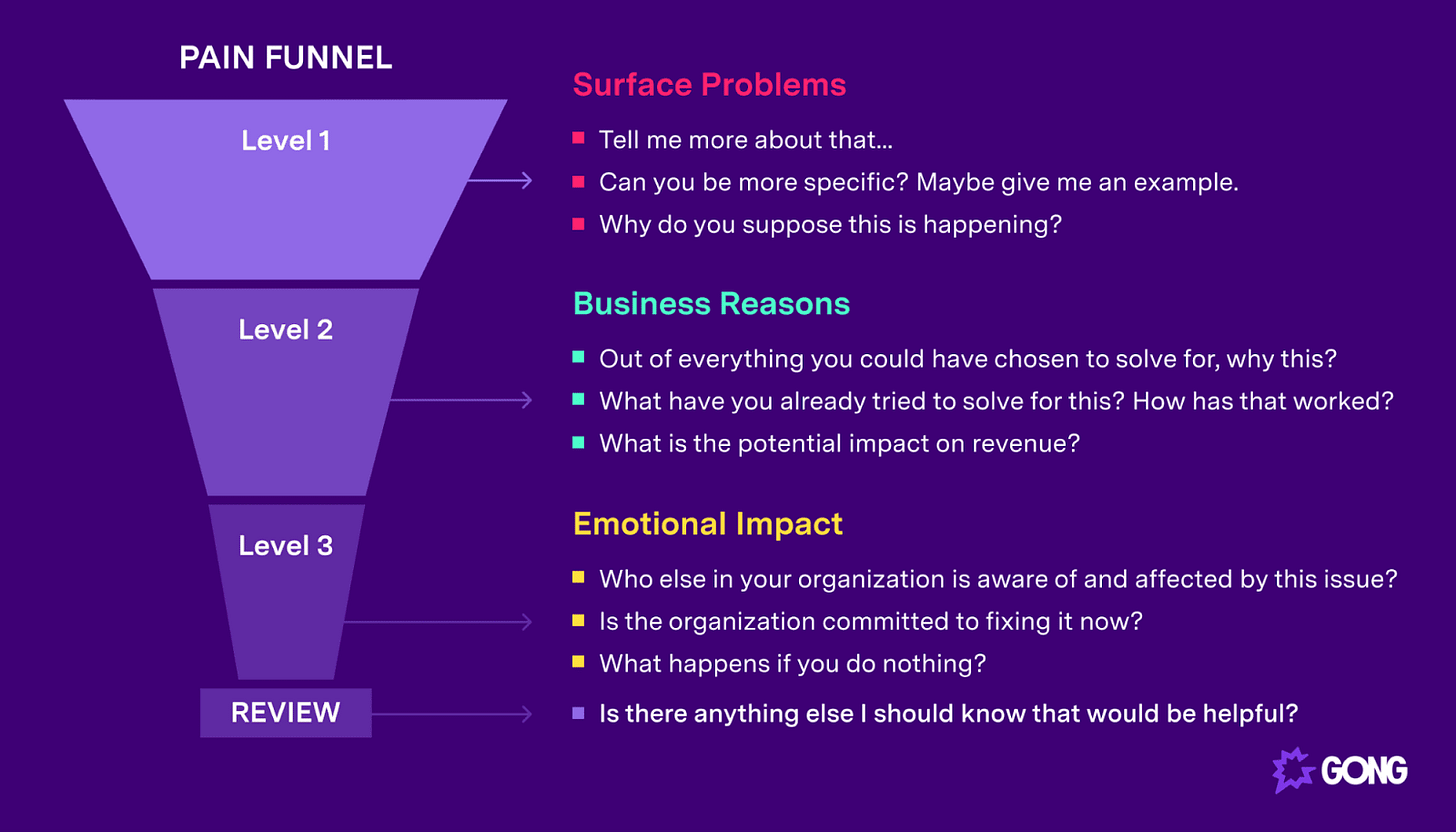
This funnel works because it helps the customer do the talking. And the more they talk, the more you learn. By the time they finish explaining their problem, your solution feels like a natural fit, not a forced pitch.
Reframing sales as service lets you sell without feeling salesy. You’re not pushing a product. You’re helping someone fix something that’s broken. When you stop pitching and start diagnosing, you create trust, not tension.
You don’t need to be slick. You just need to care enough to ask the right questions. The pitch comes last, after the problem is fully understood.
The best sales conversations feel like problem-solving sessions. And when you're the one leading that kind of conversation, you’re not just building a product. You’re building real value.
5. How to Win at Founder-Led Sales
You don’t need a formal sales background to succeed. You need a system that works for you. Winning at founder-led sales comes down to doing a few key things well and doing them consistently.
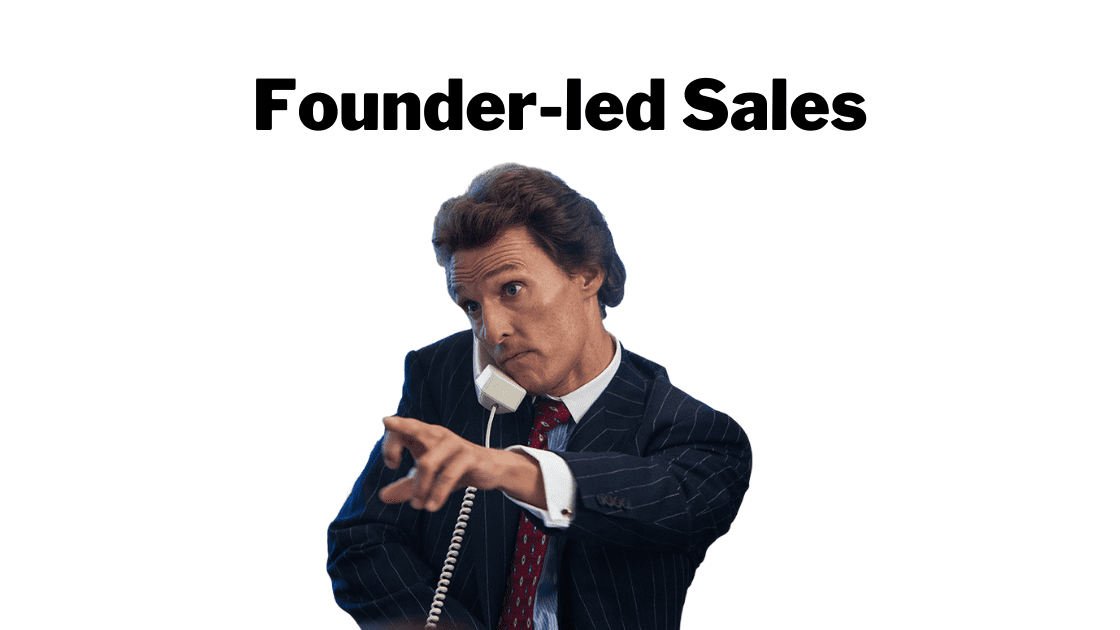
Start with the right list
Begin by building a focused customer list. Identify people or businesses who actually feel the pain your product solves. Tap into your network. Scrape LinkedIn. Use niche communities. Keep it tight and targeted. Spray-and-pray doesn’t work at this stage.
Prep for discovery, not a pitch
Go into every call with a mindset of curiosity. You’re not there to impress. You’re there to understand. Have 3–5 great questions ready. Use frameworks like the Sandler Pain Funnel to get prospects talking about their challenges. The more they share, the easier your product becomes the obvious solution.
Follow up like a pro
The sale is in the follow-up. Most founders give up too early. Send a short summary of the call, restate the problem in their words, and outline clear next steps. Don’t let good conversations fizzle. Own the process.
Close the loop
Whether a deal is won, lost, or stalled, always close the loop. Ask what worked, what didn’t, and what to improve. Every “no” is a learning opportunity. And every “yes” is a blueprint you can repeat.
You’re not just trying to sell. You’re building trust, refining your pitch, and creating the future sales playbook your team will one day use.
6. When It’s Time to Scale and Step Back
Founder-led sales doesn’t last forever. At some point, doing it all yourself starts holding the company back. The key is knowing when to make the shift—and how to do it without losing momentum.
So, when’s the right time?
Start looking to hire when sales feel repeatable. If you can predictably turn leads into customers using a clear process, you’re ready to scale. That might mean you’ve closed 20–30 similar deals, know your ideal customer profile, and can outline the steps from cold outreach to close.
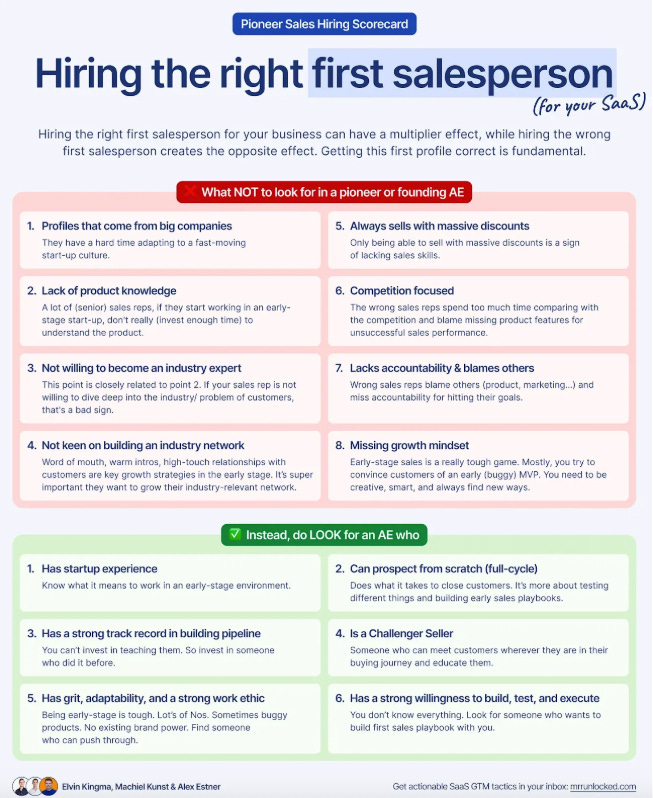
Another clear sign - you're becoming the bottleneck. If sales is taking up so much of your time that product, team, or investor work is slipping, it's time to bring in help. And if you're consistently leaving leads untouched because you can't follow up fast enough, you're leaving money on the table.
But don’t hire without a playbook
Before you bring on a sales rep, document everything - how you qualify leads, what questions work best, what objections come up, and how you handle them. A new hire shouldn't have to guess their way through your process, they should be able to step in and execute.
Think of your role as shifting from seller to sales enabler. Your job is to transfer what you’ve learned, so someone else can take the baton and run.
Founder-led sales proves the business works. Scaling sales proves the business can grow.
7. Selling as a Superpower
The best founders never fully stop selling. Even when there’s a sales team in place, the founder’s voice still carries the most weight, with customers, investors, and the market at large.
Selling isn’t just a task. It’s a mindset. It’s how you learn what matters, how you shape your product, and how you build trust from day one. Whether you’re pitching a prospect, a partner, or a potential hire, you’re constantly selling the vision. And that’s something no one can outsource.
If you’ve been avoiding sales because it feels uncomfortable or out of your skillset, know that its learnable. And it’s one of the highest-leverage things you can do as a founder. Not to become a closer, but to become a listener, a communicator, and a builder of conviction.
Founder-led sales is where momentum begins. It’s where the market speaks and where companies start to take shape. You don’t need to sell forever. But you’ll always benefit from knowing how.
Selling, when done right, isn’t about pressure. It’s about belief. That’s your edge.



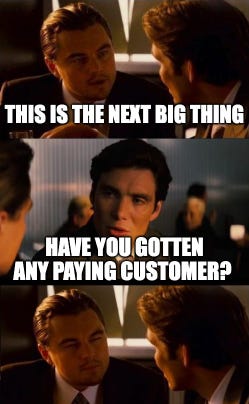
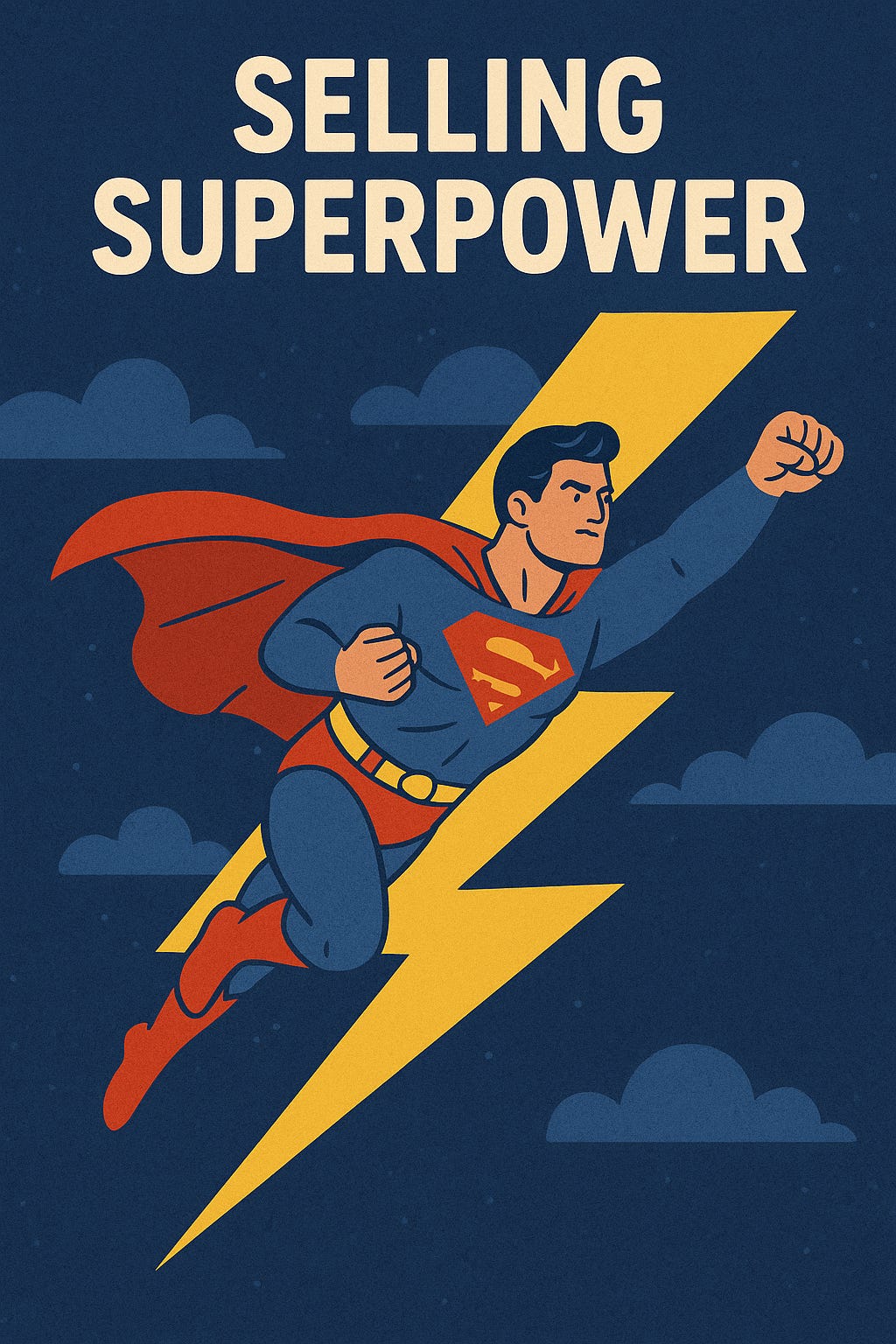
Great article, and thanks for the shoutout of my newsletter mrrunlocked.com
Thank you! I needed this...